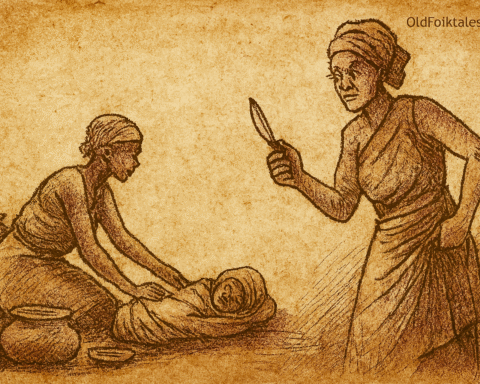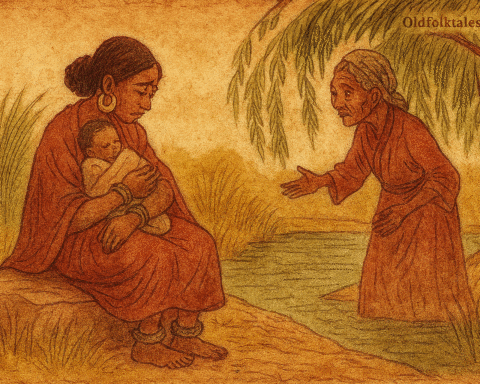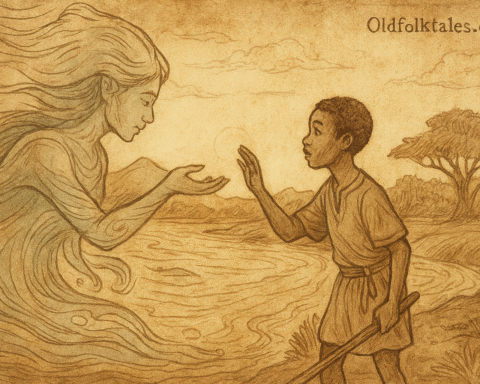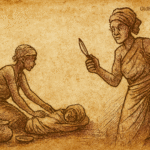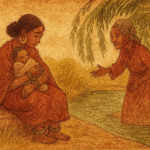Long ago in the heart of the Yoruba kingdom, there lived a gifted drum maker named Baba Olohun. His hands could carve wood so perfectly that the spirits themselves would pause to listen when he worked. Baba Olohun had no children, so he poured all his love into his craft. One day, he decided to create a drum unlike any other, one that could carry messages farther than the loudest shout. He selected a sacred tree in the forest, asking the spirits for permission before cutting it. The elders said that this tree was home to an ancient voice, a guardian spirit who spoke only to those worthy.
Baba Olohun worked for many moons, carving the wood with care and stretching the skin of the finest antelope over it. When he was done, the drum shone like the sun and its surface felt alive beneath his fingers. On the first night, as he tested it under the moonlight, the drum spoke back. Its tone was not only music but words. The spirit within said, “I am Ayan, the heart of the forest. Through me, truth will travel faster than the wind, but only in the hands of one who speaks with honesty.” Baba Olohun promised to honor the gift.
Soon, word spread about this remarkable talking drum. It could send messages from one village to another, warning of danger, announcing festivals, or calling warriors to defend the land. The sound carried over hills, rivers, and farmlands. People trusted the drum’s call because Baba Olohun never used it for lies. However, as years passed, Baba Olohun grew old. He knew his time to join the ancestors was near, so he called for the young people to choose a worthy heir to guard the drum.
Among them was Ade, a quick-witted and ambitious young man. He could play the drum beautifully, but the elders worried about his pride. Ade swore he would respect the drum’s purpose, and though some hesitated, Baba Olohun placed the drum in his care. For a time, Ade honored the promise. He drummed messages that saved villages from raiders and announced the births of new chiefs. Yet, the whisper of power grew louder in his heart. He began to wonder if he could use the drum to gain more wealth and influence.
One season, Ade saw his chance. A festival was coming, and traders from faraway lands were bringing gifts for the chief. Ade sent a false message through the drum, claiming the festival was delayed. The traders, confused, gave their goods to Ade instead of the chief. The drum’s voice felt heavier that day, its tone dull, but Ade ignored it. Encouraged by his success, he used the drum again and again for his own gain.
Soon, the villages began to distrust the messages. Once, Ade called for warriors to defend against raiders who never came. Another time, he announced the passing of a chief who was very much alive. The people grew angry. They stopped answering the drum’s call. The once-strong bond between villages weakened.
Then came the day of reckoning. A real threat approached — a band of raiders more fierce than any before. Ade beat the drum in desperation, sending the message across the land. But no one came. They thought it was another lie. The raiders swept through the village, taking food and livestock. As they left, they burned Ade’s home to the ground. In the smoke and ruin, the drum spoke one last time. “You have broken the trust of the people. My voice will no longer serve you.” The sound faded from the drum, and though Ade struck it with all his strength, it remained silent forever.
Years later, an elder found the drum abandoned under a fallen tree. She carried it back to the forest and placed it at the roots of the sacred tree from which it had been born. The forest accepted it, and the drum became part of the tree once more, waiting for a time when truth and honor would return to the hearts of the people.
Moral Lesson
The story of the talking drum teaches that trust is a precious gift, once broken it is almost impossible to restore. Words, like the beat of a drum, can unite people or divide them. Those who use their voice for honesty will be remembered and respected, but those who choose deceit will find themselves alone when they need help the most.
Knowledge Check
1. What is the cultural significance of the talking drum in Yoruba folklore?
In Yoruba folklore, the talking drum is a sacred instrument used to send messages between villages, carry warnings, and announce important events, symbolizing communication, trust, and unity.
2. Who created the magical talking drum in the story?
The drum was created by Baba Olohun, a master drum maker who carved it from a sacred tree and honored the spirit that lived within it.
3. What promise did Ade make when he inherited the drum?
Ade promised to use the drum only for honest communication and to respect its sacred purpose of uniting the villages.
4. How did Ade misuse the talking drum?
Ade used the drum to send false messages for personal gain, tricking traders and misleading the people, which caused distrust between the villages.
5. What happened when Ade tried to call for help during a real threat?
When Ade sent a true warning about approaching raiders, no one responded because they no longer trusted the drum’s messages, leading to the destruction of his village.
6. What is the main lesson from the story of the talking drum?
The main lesson is that trust, once broken, cannot be easily repaired, and using one’s voice for deceit will lead to isolation and loss.
Cultural Origin: Yoruba, Nigeria

